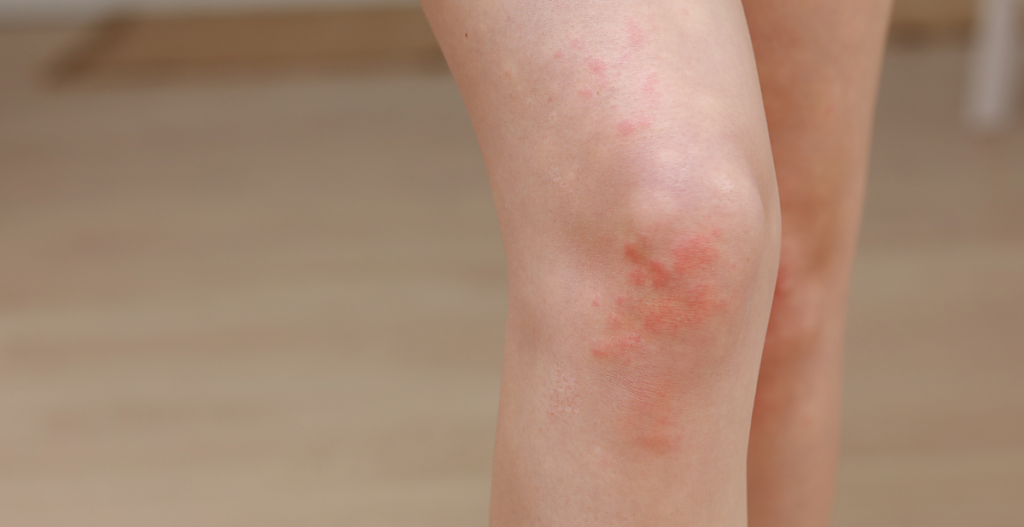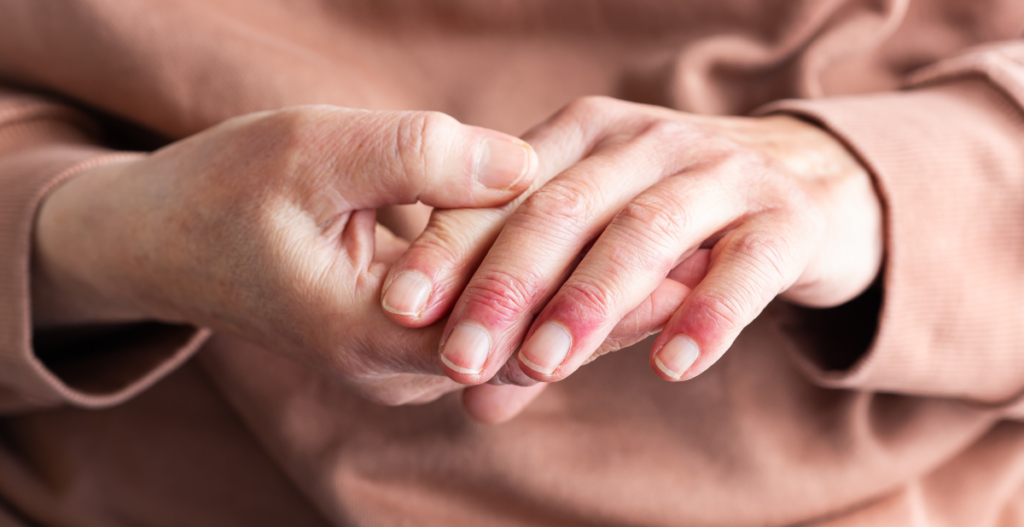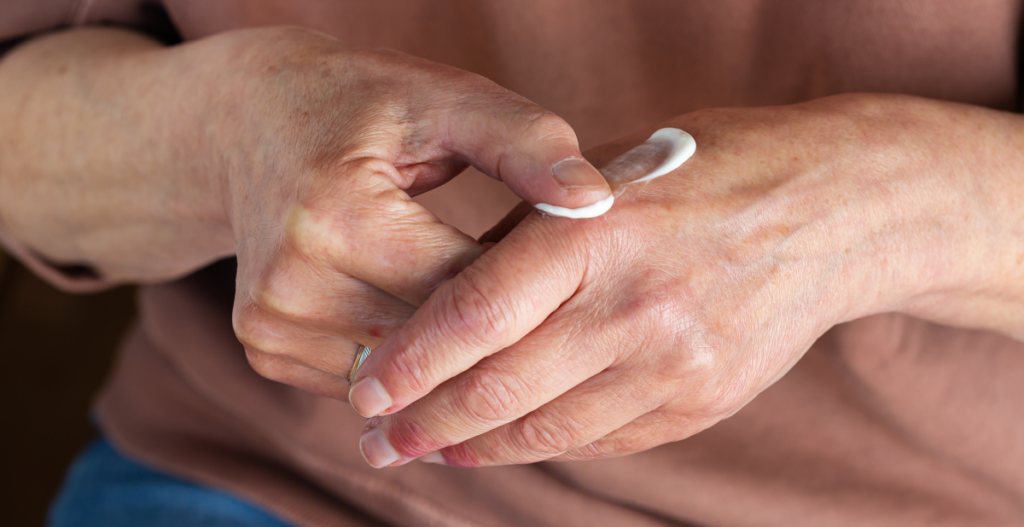Your skin has its own language. It sends you signs and tells you what’s going on without saying a word. Redness, itching, eczema… atopic dermatitis can manifest itself in many ways. But what exactly is this condition and how can it be managed?
Join us as we explore the world of atopic dermatitis with our expert Albert Navasa, ISDIN Medical Marketing Specialist.
Table of Contents
What is atopic dermatitis?
Albert Navasa helps us understand the term: “Simply put, atopic dermatitis, commonly known as eczema, is a chronic inflammatory disease that causes dryness, itching, and inflammation of the skin.” Although it’s most common in young children, it can manifest at any age, with 1 in 10 people experiencing it at some point in their lives.1
While it’s the most common pediatric skin condition, the causes of atopic dermatitis involve a variety of factors. Genetic predisposition tops the list, followed by environmental, allergenic, and dietary triggers.

Recognizing the signs
Atopic dermatitis is known for its sudden onset, often appearing anywhere on the body as small, itchy scales or rashes. Everyone experiences it differently, and the symptoms can vary a lot from one person to another. Common signs include:
- Dry, chapped skin
- Persistent itching
- Rashes, which may vary in color depending on skin tone
- Formation of scabs
- Increased skin sensitivity
- Darkening of the skin around the eyes
In individuals with darker skin tones, it may also present itself as small raised bumps. It’s important to remember that, while many people with atopic dermatitis may experience similar symptoms, these can also be caused by something else: “To accurately diagnose atopic dermatitis, it’s best to see a dermatologist,” Albert advises.
Knowledge is power
Living with a skin condition can be frustrating, but the good news is that atopic dermatitis isn’t serious. In fact, it’s a benign condition that’s more common than you might think.
Ever heard of eczema? Albert explains the connection: “Eczema is the general term for skin conditions that cause swelling and itching. Atopic dermatitis is the most common form of eczema.”
This condition is primarily characterized by dry skin. And while it can be uncomfortable, Albert points out that atopic dermatitis is not contagious.
“Atopic dermatitis is not contagious.”
– Albert Navasa, Corporate Medical Marketing Specialist

Who does it affect?
A common belief is that only children have atopic dermatitis, but it can actually affect people of any age. Albert clears up this misconception: “The truth is, you can develop this skin condition at any stage in life.”
Roughly 25% of children will experience this condition at some point, while it affects 7-10% of adults.2 In kids, atopic dermatitis typically flares up on the face, in the creases of elbows and knees, on the legs, and even the scalp. In adults, it can appear anywhere from head to toe!
One thing both children and adults do share is the range of symptoms: from mild to severe itching and the skin lesions that often result from the inevitable scratching.
Time of onset
There’s no way to predict when atopic dermatitis is going to appear, as it can show up—or not—at any point in one’s life. It can also be triggered or made worse by factors like stress, poor dietary choices, or the use of skincare products that aren’t quite right for you.
So, what’s your best defense? Taking proactive steps to nurture and protect your skin.

How to take care of atopic skin
Albert emphasizes that the first rule in managing atopic dermatitis is to avoid anything that makes your skin worse, such as products that cause irritation or reactions. It’s also important to have a game plan for managing flare-ups and relieving itchiness. Here’s the breakdown:
- Keep your nails short: This simple tip will help you resist the urge to scratch — or at least make the scratching less intense!
- Shorten your shower time: Aim for less than ten minutes and avoid steaming hot showers, as hot water can strip away your skin’s natural oils and potentially cause irritation. Choose gentle pH-balanced products with natural ingredients, such as oatmeal.
- Be gentle when drying off: Pat your skin carefully with a towel instead of rubbing.
- Use moisturizing creams or lotions: Keeping your skin well hydrated and replenished is crucial. Remember: Consistency is key!
- Wash new clothes and avoid harsh fabrics (this includes your wardrobe and bedding): Go for cotton, especially for items that come in direct contact with your skin.
- Consider using specific treatments and products for the condition — always under the guidance and recommendation of a dermatologist.
Expert tip: While our medical experts have contributed to and verified the information in this post, there are other official resources available on atopic dermatitis. Check out the websites below to learn more about this skin condition:
→ National Eczema Association
→ American Academy of Dermatology (AAD)
→ American Academy of Pediatrics (AAP)
Love every inch of your skin
While there’s no cure for eczema, a lot of children see their symptoms improve as they grow older, while some adults experience flare-ups that come and go. This is completely normal because our skin, like life, has its ups and downs.
The secret to healthy skin lies in the choices we make every day. It’s often the simple rituals we incorporate into our routines that have the most profound impact, not only on our overall well-being, but also on the general health of our skin.
→ Make annual appointments with your dermatologist.
→ Do your best to keep stress at bay.
→ Eat a nutritious diet.
→ Make getting enough sleep a priority.

References:
- Frazier W, Bhardwaj N. Atopic Dermatitis: Diagnosis and Treatment. Am Fam Physician. 2020 May 15;101(10):590-598.
- Avena-Woods C. Overview of atopic dermatitis. Am J Manag Care. 2017 Jun;23(8 Suppl):S115-S123.
- Langan SM, Irvine AD, Weidinger S. Atopic dermatitis. Lancet. 2020 Aug 1;396(10247):345-360. doi: 10.1016/S0140-6736(20)31286-1. Erratum in: Lancet. 2020 Sep 12;396(10253):758.




